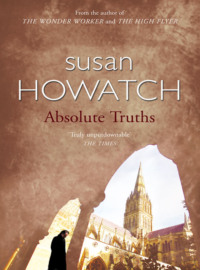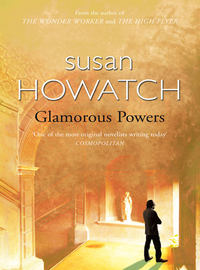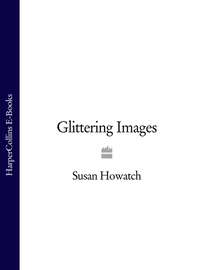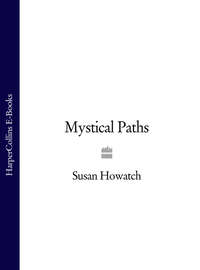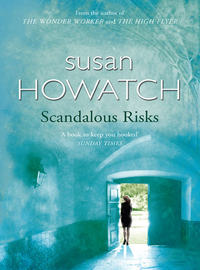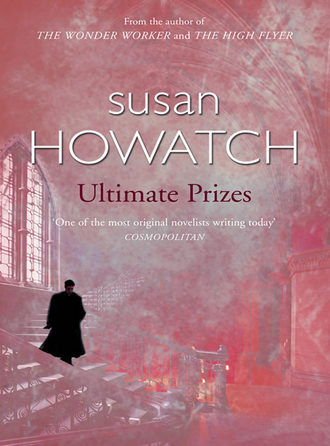
Полная версия
Ultimate Prizes
‘I think William Temple will be a tremendous Archbish, he’s so substantial, isn’t he, and I don’t just mean in weight. He’s so human and sympathetic, not like that pompous old prig Archbishop Lang who was so beastly to the Prince of Wales. Now, what I want you to tell me is this: what does William Temple think? Someone said he was a Christian Socialist and someone else said his thought is a blend of Hegelian Dialectic and Platonic Idealism. I’ve heard of Plato (just) but who or what is Hegelian? It sounds like a kind of cloth – or possibly a very grand butler – and the syllables have such a thrillingly sumptuous ring. Write soon, I implore you, and expound on these esoteric mysteries to your most grateful disciple, DIANA DOROTHEA TALLENT.’
Much amused I immediately picked up my pen and seized the chance to divert myself from the problems I was unable to face.
VII
I thought she would soon lose interest in the intellectual aspects of the Church, but her desire to learn persisted until I could only conclude her interest was genuine. I kept my explanations simple, in the belief that clarity is more important to beginners than complex detail, and I did make an effort not to talk down to her. Again Dido responded with gratitude.
‘… and thank you so much for explaining about divine Hegel – I was enrapt and shall now see everything in terms of thesis, antithesis and synthesis. My personal thesis was the frivolous society girl, my antithesis is the serious-minded student thirsting for enlightenment, but what will my synthesis be??? No, don’t answer that question, just go on telling me what churchmen think – or rather, think. (When people think, it might only be about the weather, but when they think, it can only be about things that are vital.)
‘Charlotte says you’re a Protestant, not a Catholic, which is most confusing as I thought the whole point of the Reformation in England was that we got rid of the Catholics, said “Yah!” to the Pope and lived happily ever after as the Protestant Church of England. Why are these Catholics still around? Anyway I’m glad you’re a Protestant, Protestant services are so deliciously austere and I’ve never been keen on all those flamboyant candlelit genuflections and horrid smells which the Church of Rome finds so essential.
‘Charlotte also said you were a Liberal Protestant, which sounds so enlightened, though I’m told “Liberal” in religion isn’t the same as “Liberal” in politics, which is just as well since the political Liberals are nearly extinct. Finally Charlotte said you were a Modernist, which sounds thrillingly wild and abandoned, like those artists who throw a pot of paint at the canvas and call the result A SUNNY AFTERNOON IN THE BOIS DE BOULOGNE. Now Archdeacon dear, do tell: what do all these exotic Church labels really mean?’
By this time I was so enjoying the task of expanding her intellectual horizon that I savoured her letter for an entire week while I reflected on my reply. Finally after a friendly opening paragraph I wrote:
‘… and now let me address myself to your enquiries. The Reformation did indeed re-form the Church in England into the Church of England, but although Catholicism was greatly purged during the following decades it was never eliminated. It had a strong resurgence in the last century (the phenomenon was known as the Oxford Movement) and even today, although most of the Church is Protestant there is a powerful, vocal and influential Anglo-Catholic minority. The pertinent word here is “Anglo”. They’re our own home-grown breed of Catholics, loyal to the Church of England and owing no allegiance to the Pope. However, they’ve become increasingly keen on the idea of reunion with Rome, a pipe-dream which I’m bound to say I believe to be not only Utopian but misguided.
‘This Anglo-Catholic group is known as the High-Church party. Opposite them on the other wing of the Church are the Protestant Evangelicals, also known as the Low-Church party, another powerful and vocal group which unfortunately has suffered from indifferent leadership during this century. This no doubt helps to explain how the Anglo-Catholics have managed to grab power in so many important places, but the Evangelicals will rise again and put the Anglo-Catholics back in their place, of that I’m quite sure. Catholicism is fundamentally alien to the British temperament. The tradition of the stiff upper lip, the modest understatement and the horror of foreigners is incompatible with a tradition of embarrassing emotion, ritualistic excesses and the ethos of Southern Europe.
‘In between these two militant wings lie the middle-of-the-road moderates who constitute the majority of church-goers. The services I conduct are aimed at this majority although I do incline to Low-Church practice. Certainly nothing would induce me to dabble with incense, auricular confession, perpetual reservation of the Sacrament or any other cause so dear to the Anglo-Catholic heart.
‘I should perhaps explain here that the Evangelicals play down the importance of the Liturgy (the centrepiece of Anglo-Catholic worship) and play up the importance of the Bible and the sermon. Nonconformist Evangelicals (those Protestant sects which don’t belong to the Church of England, such as the Methodists and the Baptists) can be fatally bibliolatrous (that is to say, they often believe every word of the Bible to be literally true) but in the Church of England, which places such a high value on enlightened scholarship, I’m glad to say that such a crude approach to religious truth is rare. Although I’m a Low-Churchman by inclination I have always insisted that my religion be compatible with the best modern scholarship – and that, my dear Miss Tallent, brings me to MODERNISM.
‘Modernism cuts across all parties in the Church of England. It also existed in the Roman Catholic Church (in a far more extreme form, I may add, than it existed among the Protestants) but the trend was exterminated by Papal decree earlier in this century. In other words, it’s as possible to be a High-Church Modernist as it is to be a Low-Church Modernist. Modernism is less a creed than an attitude of mind.
‘In short, we believe in reinterpreting Christianity in the light of modern knowledge. Consequently we welcome all scientific advances – in geology, anthropology, psychology, chemistry, physics and so on – and use them as a springboard to an expanded spiritual enlightenment. This leads, inevitably, to the expression of theological views which startle conservative people in all parties of the Church and scandalize the ordinary layman – with the result that Modernists are occasionally accused of heresy. This is usually quite unjustified. All genuine Modernists (and here I discount the eccentric crackpots who give the movement a bad name) hold fast to the Divinity of Christ, the Resurrection and the concept of Eternal Life. They are therefore orthodox believers. But exactly how Jesus was the Son of God and in what manner he was resurrected and in what sense one is to interpret “Eternal Life” – these are questions which the Modernists hold are open to constant revision in the light of modern knowledge. For example, Modernists don’t believe in miracles; they don’t believe in anything which contradicts the scientific order. But they still believe that Jesus was the sort of man whom people believed capable of performing miracles; they still believe in the absolute centrality of Christ to the Christian faith.
‘Because the Modernist movement is based on an attitude of mind and not a creed, there’s a large amount of disagreement among us. Some Modernists believe that women should be ordained, for example, but in my opinion such a view is too extreme. I always take care to be moderate and sensible in my Modernism so as not to give needless offence to my superiors. It’s well known that Raven’s support of the ordination of women has cost him a bishopric. When extreme views are under consideration, one always has a moral duty to discern where to draw the line.
‘To sum up, my moderate Modernism complements the so-called Liberal Protestant theology which evolved among enlightened Victorians. I believe (and this belief chimes with Darwin’s work) that the world is evolving steadily in accordance with God’s purpose for mankind, a purpose which is fundamentally good and benign. I believe that sin and evil aren’t as important as man’s basic goodness, the goodness which is exemplified for all time by Our Lord Jesus Christ. I believe that God is immanent in this world and that the Holy Spirit is present as a spark in every member of mankind.
‘Because of my adherence to such beliefs I strongly disapprove of the new school of theology which is trying to displace the glory and the nobility and the intellectual quality of Liberal Protestantism with an anti-intellectual, pessimistic, degrading approach to God’s creation. This neo-orthodox school (I use the word neo-orthodox because the theology is in some ways a barbarous reversion to old-fashioned Calvinism) is also known as the theology of Crisis (the word “Crisis” being used in a somewhat technical sense and meaning that we’re all undergoing the ordeal of awaiting God’s judgement). It emphasizes mankind’s sin and misery and says that God isn’t immanent but utterly transcendent, quite unknowable by man. Meanwhile the role of Christ is played down; he merely becomes a salvation event. How repellent! Instead of the forgiveness and compassion of Christ we’re offered the judgement and punishment of God; instead of the Christian message of hope we’re offered a vision of hell and despair. Yet this “neo-orthodoxy” is a rising tide, thriving on the suffering and guilt produced by two world wars. God is seen not putting Himself at one with us out of love and compassion but standing over and above us as He plays the stern father and metes out the punishment. All I can say is that to those of us who are revolted by the concept of stern fathers meting out punishment, this theology is utterly nauseating.
‘And now, Miss Tallent, if you’re still conscious after my diatribe against neo-orthodoxy, I shall end this sermon by apologizing for writing to you at such length. Should you, however, be interested in hearing more about Liberal Protestantism, I can describe in my next letter the thought of the quintessential Liberal Protestant of the twentieth century, Dr Charles Earle Raven, a former canon of Liverpool Cathedral who’s currently Regius Professor of Divinity at Cambridge and Master of Christ’s College. As I’ve already mentioned, his more extreme flirtations with Modernism are best ignored, but his general credo is one with which I find myself profoundly in sympathy …’
I thought that having wheeled on the heavy intellectual artillery I might have reduced Dido to a bemused silence, but never was I more mistaken. Replying by return of post she embraced my cannon-fire with delight.
‘… and I can’t tell you how grateful I am to you for taking the time and the infinite trouble to introduce me to this new world where I feel sure my future husband is lurking behind some Liberal-Protestant-Modernist bush! What a romantic name Charles Raven is! I feel he ought to be a hero in a novel by Elinor Glyn. Is he handsome? And how old is he? More details, please – oh, and when you write back, could you explain what difference there is, if any, between “idealism” and “Idealism” with a capital I? Liberal Protestants sound beautifully idealistic, so romantic, but on the other hand William Temple, who is said to be a Platonic Idealist (among other things), must need to be very down-to-earth and unromantic as he’s the Archbishop of Canterbury and obliged to deal with all the cynical politicians. What is this Idealism which belongs to Plato? Explain, please!
‘What worries me is that idealists (in the colloquial sense) aren’t usually successful in life and I need to marry a potentially successful husband so that my social gifts can come into full play. But on the other hand perhaps the Church is the one place where idealists can be madly successful with the result that the episcopal bench in the House of Lords is simply littered with idealists – like that extraordinary Bishop of Chichester, George Bell, who’s always saying we mustn’t be beastly to the Germans who aren’t Nazis, although how he expects us to separate the wheat from the chaff when they’re up in the sky bombing us to bits, I really can’t imagine.
‘Oh, how I’d love to be a bishop’s wife! I’d run the episcopal palace very efficiently and organize gorgeous garden-parties for the diocesan clergy and give fascinating little dinner-parties for sixteen every week and I’d raise lashings of money for the Poor and dress very tastefully whenever I had to open a fete, and I’d wear wonderful hats when I visited the House of Lords to hear my husband speak – and I’d behave beautifully at Lambeth and Bishopthorpe whenever we were invited for a weekend with the Archbishops, because by that time I’d be well-educated and serious-minded and quite different from the ignorant creature I am now. I’m sure some future bishop must see my potential if only I can meet him – and I’m beginning to see him quite clearly now in my mind’s eye.
‘I want a Liberal Protestant (definitely not an Anglo-Catholic or a neo-orthodox Protestant) with Modernist leanings, and he must be a few years older than me, but not too old, say around forty – in the prime of life – and being nouveau riche myself I shan’t mind if he’s not blue-blooded so long as he speaks correctly and knows how to behave. He should be an Oxford man but a Fellowship of All Souls is not essential. (One can’t have everything.) He should have a deep voice – so masculine – and preach sermons which make me want to cry (I always cry when I feel spiritually uplifted) but he shouldn’t rant and roar. His manner should be cool, austere and dignified.
‘I shan’t mind if he’s not handsome but he must have something about him which is irresistibly attractive – deepset blue eyes perhaps (so heroic) – or a high forehead or broad shoulders or (most scrumptious of all) a very straight firm mouth which represents a MASTERFUL NATURE. I’ve never seen the point of pursuing the sort of man who allows a woman to trample all over him. Men must be men, otherwise why bother, one might just as well live with a woman. I’m sure there must be quite a few men in the Church of England or else it wouldn’t be such a powerful national institution, although bounders like Rollo always say that the men who are against fornication are always the ones who are incapable of it. But bounders like Rollo have no choice but to say that, have they? It’s the only way they can make their weakness look like strength.
‘Well, Archdeacon dear, I’ll stop prattling now, but do write soon – don’t leave me in suspense for a whole week this time – and make sure you give me a few tips on how I can spot a neo-orthodox supporter at fifty paces and take immediate evasive action. Ever your devoted disciple, DIDO TALLENT. P.S. What is soteriology?’
I phrased my reply to this last question when I was shaving. I looked into the mirror at my deepset blue eyes, my high forehead and my straight firm mouth and thought: My dear Miss Tallent, the word ‘soteriology’ refers to matters pertaining to salvation, a state which may well elude you if you continue to write flirtatious letters to a married man …
And I vowed to terminate the correspondence.
But I didn’t. Instead I wrote: ‘My dear Miss Tallent, I’m a clergyman, not a dictionary, so I shan’t waste time defining soteriology; I shall merely ask who’s been talking to you of soteriological matters! It sounds to me as if you’ve already brushed against a follower of neo-orthodoxy. Did he thunder that we’re all “under judgement”? If ever you hear this phrase, the odds are that you’re in neo-orthodox country and you should beat a quick retreat to more Liberal pastures.
‘Meanwhile rest assured that if I meet a Liberal Protestant with the kind of Modernist leanings which would never damage his chance of episcopal preferment, I shall unhesitatingly point him in your direction! Professor Raven, I fear, is quite unsuitable, being not only a non-starter as a bishop (see my previous letter) but far too old for you (nearly sixty). He’s also a married man – and I’m afraid you really can’t go around chasing married clergymen. “There’s no future in that,” as a clever woman bent on capturing a future bishop might say, and I think on the whole you’d be best advised to look for a husband of your own age. Men of forty nowadays are usually either married or homosexual. And now to intellectual matters. Platonic Idealism is the father of our colloquial “idealism”. The Greeks believed …’ And for a further two pages I wrote fluently on the subject of Plato’s philosophy.
I was just congratulating myself on conducting this exceedingly enjoyable correspondence with such faultless propriety – a correspondence which my perfect wife never once asked to see – when my harmless epistolary friendship began to swing stealthily out of control.
I was invited by Lady Starmouth to spend a weekend at the Earl’s country house.
THREE
‘Comfort, power, the applause and wonder of men – is there any Church in Christendom, or any Christian soul, not deeply tainted with these things?’
CHARLES E. RAVEN
Regius Professor of Divinity,
Cambridge, 1932–1950
The Cross and the Crisis
I
I was greatly surprised by the invitation. I had met the Starmouths through Alex soon after he had appointed me his Archdeacon in 1937, but they had remained mere distant acquaintances, and although Lady Starmouth had a reputation for befriending clergymen I had always suspected she found me too dull to merit her special attention. Certainly in her presence I had found it difficult to shake off a sense of social inferiority which made me appear shy and awkward. Yet now for some reason Lady Starmouth had decided to take trouble with me. Moreover in the same post I received a letter from the Earl himself saying that he did hope I was free to accept his wife’s invitation as he was most anxious to hear me preach. Would I deliver a sermon at his local parish church? Now I was no longer merely surprised. I was amazed and excited. Lord Starmouth was one of the most influential laymen in the Church of England and always spoke on important Church matters in the House of Lords. If he wanted to hear me preach I was indeed being thrust into the ecclesiastical spotlight.
‘What an opportunity!’ I exclaimed in jubilation to Grace.
‘It’s very exciting for you – and so kind of Lady Starmouth to invite us both,’ said Grace, ‘but of course I can’t possibly go.’
There was a silence. We were in the study where I had been opening the morning’s second post. As soon as I had read the vital letter, I had called Grace to join me.
‘It’s you they want,’ she said in a rush as the silence lengthened. ‘They’re just inviting me out of politeness, and it would be much better if you went on your own.’
All I could say was: ‘You’re coming with me.’
‘But the children –’
‘You’re coming with me.’
‘But what on earth shall I wear?’
‘Buy whatever’s necessary.’
‘But the coupons –’
‘Steal them.’
‘Neville!’
‘All right, borrow them! I was just trying to make you understand how absolutely vital it is that you come with me! It would be the height of foolishness if you evaded this invitation – Lady Starmouth would almost certainly be sceptical about any excuse you might make, and if she feels she’s been snubbed, what kind of position do you think that would put me in?’
‘In that case we’ll have to take the children with us.’
‘Don’t be absurd! We can’t do that when the children haven’t been invited! We’ll have to leave them with Nora or one of your other friends.’
‘I don’t like to impose –’
‘No, but this is the one occasion where you must be ruthless – or if you really can’t face tackling Nora I’ll tackle Emily. I’ve no scruples at all about imposing on my sister in urgent circumstances.’
‘I always feel so awkward about asking Emily to have the children when she has no children of her own –’
‘Nonsense – they’ll provide a welcome diversion from that dreary husband of hers! Now listen to me, Grace. I quite understand why you should feel this weekend will be an ordeal, but it’s an ordeal you’re perfectly capable of surmounting – all you’re being required to do is to look pretty and be polite. I’m not trying to throw you to the lions. I’m just trying to ensure you don’t miss out on an exciting and worthwhile excursion. Make up your mind you’re going to enjoy yourself! Why not? Why shouldn’t it all be great fun?’
But Grace only said in despair: ‘How I wish we’d never left Willowmead!’ and I heard her stifle a sob as she rushed from the room.
II
‘I didn’t mean it, Neville – of course I didn’t mean it – I just feel nostalgic about Willowmead sometimes, that’s all …’
I had followed her to our bedroom where she had retreated to calm down, and as we faced each other we could hear the charwoman talking good-naturedly to Sandy as she worked in the drawing-room below us. Primrose was at nursery school as usual. I was supposed to be on my way to a diocesan committee meeting, and I was acutely conscious of the clock ticking on the bedside table as I was obliged to delay my departure.
‘I know how much you loved Willowmead,’ I said, ‘but we’ve been happy in Starbridge too and we’re going to go on being happy here.’
‘Yes, of course. I’m sorry.’
‘To be honest, I find the Starmouths intimidating as well. But one can’t spend one’s life cowering in corners just because one feels socially inferior!’
‘No, of course not. Will there be a maid, do you think, to unpack our suitcases? I don’t want anyone seeing my darned underwear.’
‘In that case I’ll tell the servant we don’t require help with the unpacking. Now Grace, stop worrying yourself into a frenzy, there’s a good girl, and make up your mind you’re going to be strong, brave and resourceful!’
‘Yes. All right. I’ll try,’ she said, but my heart sank as her shoulders drooped.
Willing myself not to despair I hurried off to my meeting at the diocesan office on Eternity Street.
III
Starmouth Court stood not, as might be assumed, near the port of Starmouth in the south of the diocese, but eighteen miles from London in the county of Surrey; the Earl’s connection with Starmouth was lost in the mists of antiquity. When we eventually arrived at our destination on a sunlit Saturday morning in July, I was just as horrified as Grace to discover not a friendly country house but a tall stout elderly mansion of forbidding proportions. Accustomed though I was to calling at the various grand houses in my archdeaconry, I had never been invited to stay the night in these places and the thought of being a guest in the Starmouths’ overpoweringly dignified country seat made me feel for a moment like a fallen woman obliged to take refuge with a formidable maiden aunt.
Built high on a hillside the house was surrounded by trees and approached by a long winding drive which strained both our nerves and the engine of the chauffeur-driven motor which our hostess had sent to meet us at the station. ‘“Childe Roland to the Dark Tower came,’” I muttered to Grace before the Dark Tower was revealed as the plump Queen Anne palace. I allowed myself one quick shudder before resolving fiercely to appear self-possessed. ‘Isn’t it exactly like the country house in a detective story?’ I murmured to Grace with a heroic attempt at nonchalance. ‘I foresee corpses in the library, a sinister butler lurking behind the green baize door and Hercule Poirot hovering in the shrubbery!’


